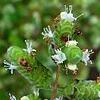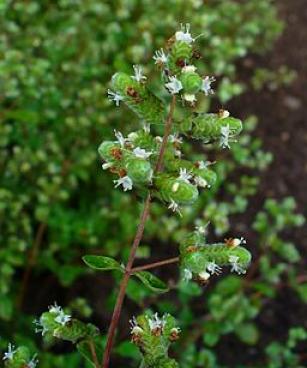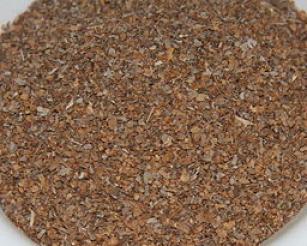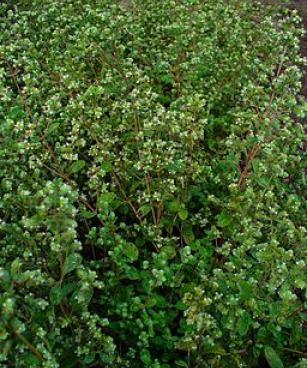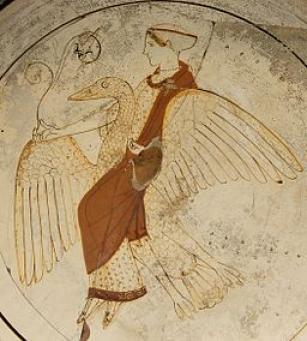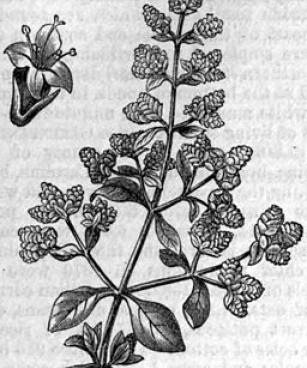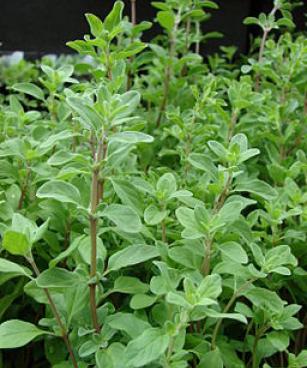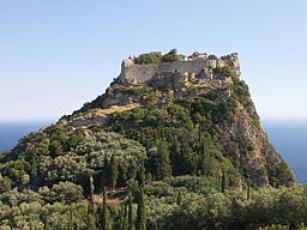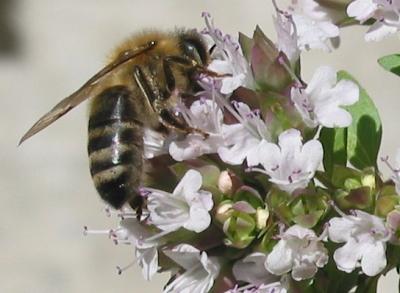The Origanum species of aromatic herbs are natives of the Mediterranean region, North Africa and Western Asia.
The genus name "Origanum" is derived from the Ancient Greek words translated as "joy of the mountains". Sweet marjoram is a perennial herb with smooth, dark green ovate leaves and flowers spiky clusters of small, whitish-pink blossoms.
Sweet marjoram is probably best known as a culinary herb, a milder and sweeter version of oregano. In Ancient Greece and Rome it was used to season meat sauces and in Medieval England applied in brewing techniques to add bitterness to beer and ale.
Today it still features prominently in Mediterranean, French and Middle Eastern cuisine as a condiment and flavours various liqueurs and vermouths.
Ancient aromatic
Its use an an ingredient for the manufacture of perfumes and medicine goes back to the time of Ancient Egypt. In the classical world, olfaction, wisdom and knowledge were intertwined; the Latin word "sagax" not only had implications of intelligence or shrewdness but of a keen sense of smell.
Marjoram or "sopho" was a herb aligned with the crocodile god Sobek; a warming, penetrating herbal scent used in perfumes, medications and mummy garlands.
In Ancient Greece marjoram was dedicated to the goddess of love Aphrodite, whose gentle touch was said to have given the plant its scent. The flowers were used in wedding ceremonies to crown couples, a symbol of love and happiness. This is mirrored in the Victorian language of flowers where marjoram too holds jovial connotations.
The herb was also placed on graves to bring spiritual peace to the deceased. It was believed that if marjoram grew over a grave, the departed had found contentment.
Dioscorides, the Ancient Greek physician, mentions recipes for sweet marjoram perfumed oils, ointments and poultices mixed with honey in his pharmacopaeia.
The philosopher Theophrastus wrote that the people of Syria produced an intoxicating aroma from the flowers and leaves of marjoram. Greeks living in the area of present day Syria made a perfume called "Amarakinon" or "Sampsoukhinon" from sweet marjoram that was stained pink from the flowers. The perfume was sold to Athenian women and said to be so strongly scented that it caused headaches.
The Ancient Romans were also quite enamoured with the aroma of sweet marjoram. A Roman perfume "Sampsuchum" was made with marjoram("amaracus") oil. Aromatic powders known as "diapasmata" mixed marjoram with other herbs and spices and were sprinkled among clothes, drawers and on floors in the Roman home.
The naturalist Pliny describes marjoram poultices from Cyprus, home of the "most prized, aromatic" plants. Cyprus was the birthplace of Aphrodite, or Venus, as she was known in Roman times and a famous centre of her worship. The island of Kos was also well known for sweet smelling marjoram and the Anatolian city of Cyzicus renowned for its pure essence of "amaracus".
Both Dioscorides and Pliny write of the use of sweet marjoram for gynaecological symptoms, describing how the strong scent of marjoram equated to the strength of the medicine.
Traditional uses
In Medieval times sweet marjoram was employed as a strewing herb; as Oliver Goldsmith comments "aromatic plants bestow no spicy fragrance while they grow; but crush'd or trodden to the ground, diffuse their balmy sweets around."
The fresh herb perfumed baths and waters, nosegays and posies. Dried herb was used in potpourri and pillows to aide in sleep and also to scent the winding sheets for the deceased. Marjoram leaves would be bunched and rubbed over oak furniture or hardwood floors as their oils would seep into the wood, adding aroma and shine.
In traditional medicine sweet marjoram has applications as a nervine, carminative and externally for muscle tension, joint pain and soft tissue trauma.
The great English perfumer of the 1800's, Septimus Piesse, wrote of the oil of sweet marjoram perfuming soap but as he notes "more in France than England".
Essential oil production
Sweet marjoram essential oil is obtained via steam distillation of the dried, flowering plant for commercial use.
The scent of the essential oil can be described as warm, spicy and camphoraceous with woody, herbaceous undertones; varying according to where the oil is produced. France, Tunisia, Morocco and Egypt are major suppliers. Egypt, in particular, is a significant producer and exporter of culinary herbs and spices. The production surplus from this sector supplies the raw material for distillation herb and spice oils such as marjoram.
Aromatic constituents include myrcene, para-cymene, terpinen-4-ol and alpha-terpineol. In perfumery, sweet marjoram acts as a modifier in herbaceous and fougere type perfumes, adding spicy notes to a composition.
Sweet marjoram blends well with essential oils of basil, clary sage, roman chamomile, frankincense, lavender, nutmeg, orange, cypress, ylang ylang, bergamot, rosemary and cedarwood.
The scent of the Greek Islands
Sweet marjoram is one of the essential oils in our Greek Island blend.
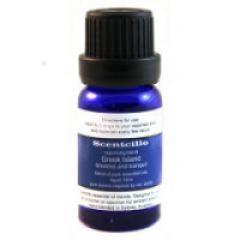
The warming, dry, herbaceous character of sweet marjoram brings to mind the atmospherics of high Summer in the Mediterranean; where herbs growing on rocky ground are warmed by the sun, infusing the air with their fragrance. It is no wonder the plant's aroma inspired such joy and contentment among the Ancients.
This supports the relaxing ambience of Greek Island blend; a fresh, joyful, expansive scent reminiscent of the Mediterranean Isles- timeless and tranquil.





